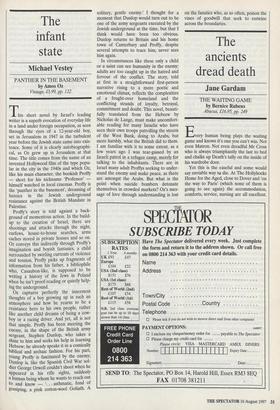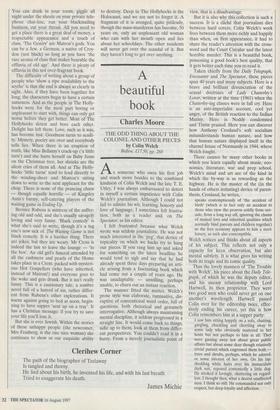The ancients dread death
Jane Gardam
THE WAITING GAME by Bernice Rubens Abacus, f16.95, pp. 249 Every human being plays the waiting game and knows it's one you can't win. Not even Matron. Not even dreadful Mr Cross who is always triumphantly the last to bed and chalks up Death's tally on the inside of his wardrobe door.
Yet this is the easeful and some would say enviable way to die. At The Hollyhocks Home for the Aged, close to Dover and 'on the way to Paris' (which none of them is going to see again) the accommodation, comforts, service, nursing are all excellent. You can drink in your room, giggle all night under the sheets on your private tele- phone chat-line, run your blackmailing business, cut your throat. All you need to get a place there is a great deal of money, a respectable appearance and a touch of class. 'The Gentry' are Matron's gods. You can be a Jew, a German, a native of Croy- don (not black) so long as you have 'the rare aroma of class that makes bearable the effluvia of old age'. And there is plenty of effluvia in this not over-fragrant book.
The difficulty of writing about a group of people who 'show a ripe availability to the scythe' is that the end is always so clearly in sight. Also, if they have been together for long, the characters begin to have a certain sameness. And as the people in The Holly- hocks were for the most part boring or unpleasant to start with, things can only get worse before they get better. Most of The Hollyhocks detest and bore each other. Delight has left them. Love, such as it was, has become lust. Goodness turns to senili- ty. Mystery, poetry are over and everybody tells lies. When there is an eruption of truth, like Miss Bellamy's crack-up Ca little turn') and she hurts herself on Baby Jesus on the Christmas tree, her shrieks are the silent cries of them all. And at The Holly- hocks 'little turns' tend to lead directly to the winding-sheet and Matron's sitting down to write to the next applicant for the chop. There is none of the prancing chaos — though equally horrific — of Kingsley Amis's barmy, self-catering players of the waiting game in Ending Up.
Bernice Rubens is mistress of the suffer- ing old and odd, and she's usually savagely loving and very funny. 'Black comedy' is what she's said to write, though it's a tag one's now sick of. The Waiting Game is not black comedy. It is a harsher thing. There are jokes, but they are weary. Mr Cross is indeed the last to leave the lounge — 'in the box'. An old girl's funeral attended by all the cashmere and pearls of the Home takes place in a Crem. packed with mysteri- ous Hot Gospellers (who have inherited, instead of Matron!) and everyone goes to the wake and gets drunk. But it isn't really funny. This is a cautionary tale, a sombre novel full of a hatred of sin, rather differ- ent from Rubens's other explorations. It warns against going to bed at noon, begin- ning to have supper 'sent up on a tray'. It has a Christian message: if you try to save your life you'll lose it.
But she is ever Jewish. Within the stories of these unhappy people (the newcomer, Mrs Feinberg, is the one nice woman) she continues to show us our exquisite ability to destroy. Deep in The Hollyhocks is the Holocaust, and we are not to forget it. A fragment of it is avenged, quite pitilessly, though the mass-murderess has become, 50 years on, only an unpleasant old woman who eats with her mouth open and lies about her schooldays. The other residents will never get over the scandal of it. But they haven't long to get over anything.



























































 Previous page
Previous page